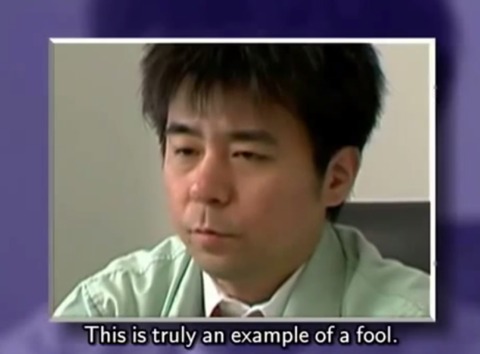
I've been combing my neurons for the best way to explain exactly what GameCenter CX is to the uninitiated, but the reality is that it's not a whole lot removed from what Giant Bomb already does. It brings to the fore what makes a serial LP series good: enjoying the host and their commentary, getting invested in their struggle, cheering for them through difficult sequences and sharing their catharsis when said sequences have finally been conquered. It then adds a well-polished if somewhat off-beat professional sheen to the whole affair, edited in such a way that it feels like you're watching some epic-scale drama rather than some guy in his 30s sitting in an office space, beating a game almost as old as he is.
GameCenter CX is a Japanese TV show that celebrates retro gaming in the best way possible: by allowing us to vicariously live through a playthrough of the featured games with a genial host who never seems to improve, but often does just well enough to see those games through to a conclusion of some sort. He also falls prey to a lot of abject bullshit as well, of course, as the NES/Famicom era wasn't always particularly fair, but if anything that just makes the show funnier. In addition, the show goes on travelogues across Japan, from the few remaining mega-Arcades to cozy street corner candy stores with a couple of game cabinets for their schoolchildren clientele to play, and it's fun to watch our host bounce off the locals. There's also plenty of direct homages to the games that went ignored in the show's challenges, including sections for the forgotten Sega SG-1000 and original Game Boy to an ongoing feature that briefly touches on every significant Famicom release in chronological order. It's a retro gaming smorgasbord that offers far more than just watching a well-edited LP.
As someone who discovered the show some time ago, I've long since become the type of fan who waits on tenterhooks for the talented folk of SA-GCCX to translate the next episode. I wanted to honor the show in my own way, which meant doing two things: A) writing a blog about it and B) ensuring our Wiki hosts a full page for every game that's been featured in a challenge. Though it's a list of around 200 games, most of them are popular enough that they've been thoroughly explicated upon already, and really this Wiki Project was a way to unwind with something simple after the 400+ SNES games of 1993 that I've spent the majority of this year adding to the database. I have a few more "gentle" Wiki Projects to hash out before I start on SNES 1994, which has even more releases than 1993. There's a mix of trepidation and excitement going into that one, that's for sure.
What follows is a list of ten games that pertained to this Wiki Project, chosen because they lacked pages (and thus, I imagine, are fairly obscure), which I intend to elaborate on while also discussing their appearances on GameCenter CX. Abunai, my friends:
Quiz Tonosama no Yabou
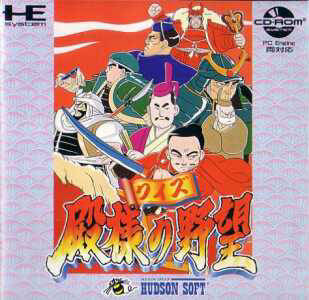
Quiz Tonosama no Yabou (S05E03): PC Engine CD-ROM, Capcom/Capcom, 1992.
Quiz Tonosama no Yabou is a Capcom-developed quiz game originally for the Arcades, but the version played on the show is the home port released for the PC Engine CD-ROM, best known in the US as the TurboGrafx-CD. The TurboGrafx-16 and its CD equivalent have been considered jokes in the US retro gamer market for a long time, due to the daft name and failure to make any kind of impact, but are also respected in equal measure for the great expanse of hidden treasures. Vastly more popular in its home nation as the PC Engine, NEC and Hudson's pioneer 16-bit console has quite the legacy that few outside Japan can appreciate. Not only did it begin the 16-bit console generation, but it was also the first console to attempt a CD peripheral. I know I've spent quite a lot of my allotted real estate on this site to pontificate on that particular system's offerings, as a curious European who saw neither hide nor hair of the thing pre-Internet. As for Quiz Tonosama no Yabou itself, it first appears to be a Koei Nobunaga's Ambition (known as Nobunaga no Yabou in its home nation, making the nominal homage somewhat transparent) strategy game clone set in the Warring States period of medieval Japan, but rather than tactically fighting large-scale battles the player simply has to out-trivia his rival daimyos to take over their territory. It's very much a superficial framing device for a trivia quiz game that covers more than simply Japanese history, which you'd think it would limit itself to for the sake of avoiding something as anachronistic as two samurais fighting over their knowledge of contemporary mecha anime.
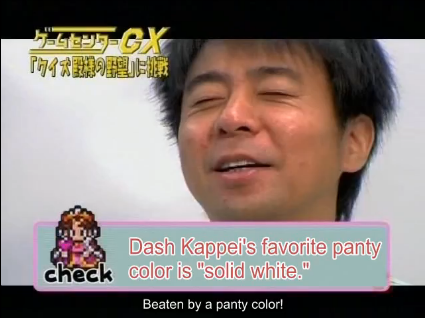
It's important to note early on that "the Kacho" (comedian Shinya Arino, who hosts the show) is never alone in his endeavors. Whenever pressed by a difficult scenario or bereft of direction, one of the show's "ADs", or Assistant Directors, will hop in front of the camera to lend some advice or demonstrate how to proceed. These ADs tend to cycle every season, coming and going within the span of a dozen episodes, yet even still it's hard not to grow attached to them. Each has their own distinctive character, partly due to their natural (or awkward, as is the usual case) presence on camera and bizarre quirks that Arino is quick to latch onto. For the most part, though, their role is entirely secondary, and if a challenge is going well enough they'll rarely feature at all.
The Quiz episodes, of which there are now several (Yuuyu no Quiz de Go! Go! (S10E03) and Adventure Quiz: Capcom World: Hatena no Daibouken (S06E06) are two others that I created the wiki pages for), are an exception to this. Inevitably, Arino determines that he simply doesn't have the breadth of knowledge to tackle every subject, and it's often the case with games like Quiz Tonosama no Yabou that the player is required to have a very high correct/incorrect ratio in order to progress. So what tends to happen is that Arino conscripts anyone on staff, including ADs, the technical crew and even uber-cool cameraman Abe to answer questions relating to their "specialist subjects". They toss answers to Arino whenever their chosen subjects appear, and face the consequences for their mistakes. They always make for fun episodes because of this communal spirit, and it's a telling glimpse into just how much of an otaku Arino really is.
Paris-Dakar Rally Special
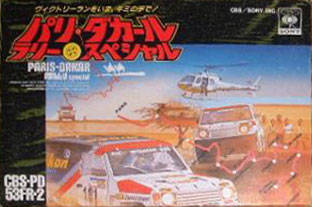
Paris-Dakar Rally Special (S14E01): Famicom, ISCO/CBS Sony, 1988.
You might've noticed that we've skipped quite a number of episodes to reach Season 14, and the reason for that is because early GameCenter CX focused on a lot of fairly familiar stuff. A lot of Marios, Zeldas, Mega Mans, Castlevanias and anything else likely to make a list of best NES games were covered in those early seasons. It wasn't until late in the show's tenure that we started to really see the obscurities show up. Fortunately, watching Arino play a game you've never heard of is still every bit as entertaining as watching him struggle with an old favorite. More so, in my view, because you end up being just as surprised as Arino is when something utterly absurd happens. And "utterly absurd" might as well be Paris-Dakar Rally Special's tagline. It's certainly the mission statement of this bizarre kusoge.
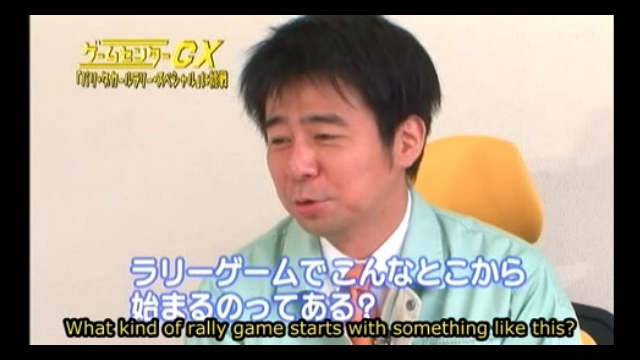
The title, "Paris-Dakar Rally Special", doesn't sound particularly special. The Paris-Dakar Rally is an endurance race that spans six thousand miles through France (the original starting point) and Spain, then across the Strait of Gibraltar and down the west coast of Africa to Dakar in Senegal. (At least that was the original course, as the present-day race now takes place entirely within South America.) The race was an impressive feat for any rally car driver and an interesting event for off-road vehicle enthusiasts (North Africa is somewhat on the sandy side, let's just say), but beyond that, it's just a very long trek and those tend to lead to not particularly exciting checkpoint-based driving games.
Paris-Dakar Rally Special ain't that. Rather than stick to the script, the game is almost a parody of what a rally game like this ought to entail. The first half hour is spent wandering around a city, on foot, attempting to secure a sponsor (for the necessary cash), a navigator and a car. This part is more or less a typical Famicom adventure game, with menus of commands and NPCs to talk to. Later chapters of the game have you driving across side-scrolling platformer levels, and one takes you under the sea for an extended period. Almost every one of these set-pieces requires a different gameplay model, so in that respect it's something of a technical coup. It is a damn weird game though, and it's worth discovering it along with Arino.
Babel no Tou
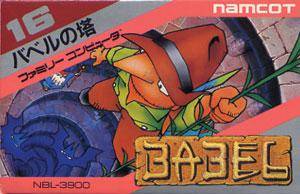
Babel no Tou (S14E10): Famicom, Namco/Namco, 1986.
Babel no Tou, or Tower of Babel, isn't a particularly notable puzzle-platformer game despite its Namco pedigree and mechanical similarity to Solomon's Key, but it did afford a rare glimpse at Arino at his most competent. Jokes about his age are often made at his expense, but there are times when being a little older and wiser can be an advantage, and that's especially true with thoughtful brainteasers like Babel no Tou.
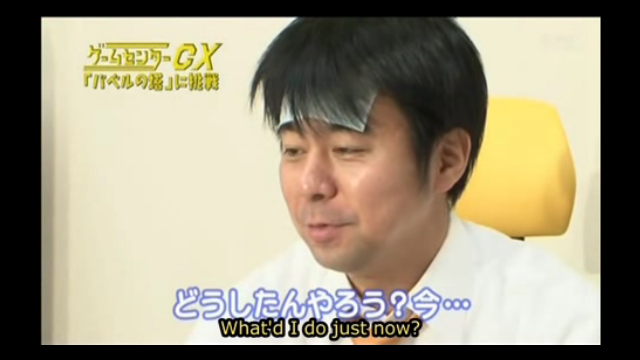
The crux of the game is to ascend the titular Biblical tower by means of tiny staircase pieces that need to be stacked on top of each other before progress can be made. These pieces operate by some basic rules that don't take long to memorize - they'll fall if nothing's underneath them, they'll switch direction along with the protagonist while being held and they'll automatically connect to adjacent pieces if they share a diagonal corner, making them serviceable staircases. In practice, though, it's a bit more of a headache than something as comparatively simple as Solomon's Key's disappearing and reappearing blocks. Despite this malus, and a second in the form of the game's considerable length of sixty-four stages, Arino becomes quite adept at it, stymied only a few times by some particularly nasty puzzles.
Kosodate Quiz: My Angel
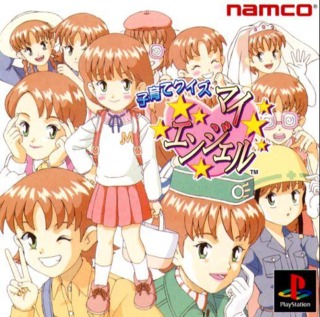
Kosodate Quiz: My Angel (S15E09): PlayStation, Namco/Namco, 1997.
A special one-off episode, and another quiz game, Kosodate Quiz: My Angel is a PlayStation (rarely does the show leave the 8-bit/16-bit era) daughter-raising sim; a genre that somehow became fairly popular in the 90s. Treating female children as little more than Tamagotchis, the goal is to raise your daughter right, eventually allowing her to live the life of her dreams upon reaching the age of 25 (which, if you ask me, is a fair few years after you're supposed to let your kids make their own decisions). If this sounds somewhat familiar, it is also the premise of the better known Princess Maker 2, though Kosodate Quiz is far more grounded in reality. No marrying off your adult daughter to Satan in this one. Also, rather than choosing what stats to focus on that day, the game presents multiple choice trivia questions, correct answers to which develop the stats in different ways. It also increases the player's cash, which is important for "event" questions where you actually have to make a decision regarding the child's progress, such as which schools she goes to. It feels less like you're min/maxing a system, and closer to responding to genuine dilemmas about child-rearing. Still totally weird and more than a little sexist, perhaps, but at least it's earnest enough.
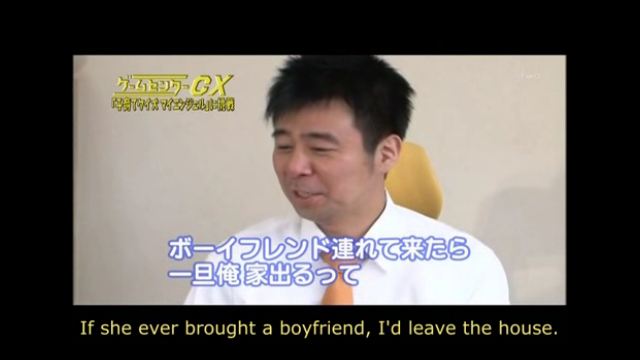
The crew had Arino play Kosodate Quiz: My Angel for the same reason they made him play Tokimeki Memorial, a dating game also for the PlayStation: It was a way to bring Arino's real-life experiences to the fore, with the showrunners deciding how best to tie them into a game challenge in some way. Tokimeki Memorial was brought in so that the married Arino might pass on his knowledge on love and romance to the staff, and with Kosodate Quiz: My Angel the show's former producer Nagashima, who had recently become a proud father to a newborn daughter, asks that Arino show off his fatherly skills, as a father of two daughters himself. It ends up being a rather schmaltzy and goofy episode, though still funny as Arino's virtual daughter becomes as big a geek as he is despite Arino's attempts to thwart that development. This episode is also notable for being the first to acknowledge Arino's overseas fans, with a reference to Kotaku's (branded "Kotak!" by Arino himself) short-lived "Retro Game Master" dub. Of course, the show's sizeable Western fanbase is largely the responsibility of SA-GCCX's excellent fan-translations, and somewhat less due to Kotaku's tone-deaf attempts to "X-treme" up the gentle charms of the show. But hey, why bother going on and on about how awful Kotaku is, am I right? What next, revelations about how the sky is blue?
Kattobi! Takuhai-kun
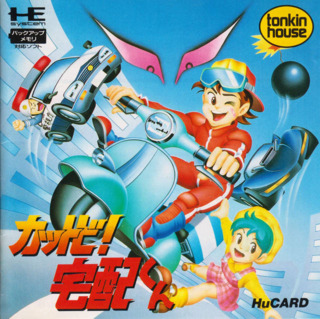
Kattobi! Takuhai-kun (S16E04): PC Engine, ACC/Tonkin House, 1990.
Like Paris-Dakar Rally Special, Kattobi! Takuhai-kun (which more or less means "Full Speed! Delivery Boy") seems straightforward enough from a cursory glance. The player, as a delivery boy, has to deliver packages around the city on a bike via a top-down view not unlike the original GTA games (see below), and is rewarded for getting to their destination as quickly and safely as possible. However, the game begins to take something of a narrative detour, or rather a whole bunch of detours, and ceases to become as black and white as it first appears. To say any more would spoil the episode.
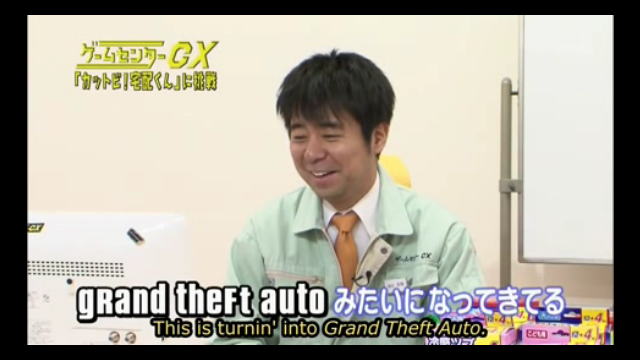
I will say that the show doesn't really touch on the TurboGrafx-16 all that much, at least not as much as I'd like. For as well-regarded as the system was in Japan, it was still nowhere near as popular as the Famicom or Super Famicom. It gets as much airtime in GCCX as the Genesis does (which might be the greater tragedy, really), but at least there's been a few really unusual choices for TG16 games to play. Rondo of Blood is just too obvious, I suppose, and Arino is notoriously poor at shoot 'em ups, which were the PC Engine's forte before more powerful consoles like the Saturn supplanted it.
Family Trainer: Jogging Race
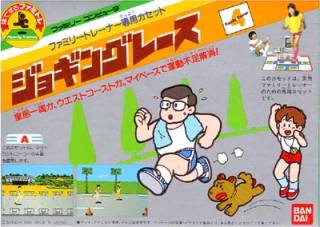
Family Trainer: Jogging Race (S17E02): Famicom, Human/Bandai, 1987.
Though there's only been two so far, the episodes featuring the Family Trainer peripheral have already become legendary. The Family Trainer is the Japanese name for the Power Pad: that big placemat of buttons that replaces the controller to allow for a more, well, visceral connection to the physically-demanding games that supported it. Jogging Race is simply a simulator in which the player jogs along scenic routes in Tokyo, with the standard alternate button-mashing protocol established with Track & Field. As the player has to enter these alternate button presses with their left and right feet, the simulation of jogging several miles around Tokyo becomes a horrifying reality. Well, horrifying if you find exercise as scary as I do anyway.
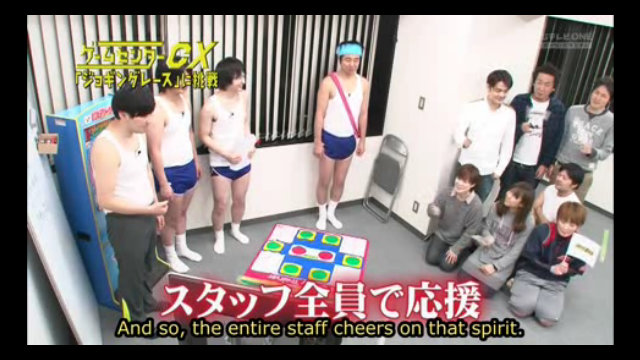
(The other Family Trainer episode is Totsugeki!! Fuun no Takeshi-jou! (S03E02), a Power Pad-enabled take on Takeshi's Castle, and the second most traumatizing game-related experience that Beat Takeshi ever indirectly inflicted on the Kacho after the inaugural episode's notorious Takeshi no Chousenjou.)
Arino, though not in bad shape for a man of his age, is clearly not used to extended periods of physical exertion. His day job as a comedian rarely requires it, save an exhausting stand-up gig or two. In Jogging Race in particular, which throws obstacles in the player's way for its enervating and more action-oriented "Tokyo Marathon" mode, he'd often collapse after several grueling minutes of constant jogging on a giant controller. It got to the point where the challenge could only be completed by a relay team of four staff members including Arino, each wearing a goofy jogging outfit. It made for quite the memorable sight.
Best Keiba Derby Stallion
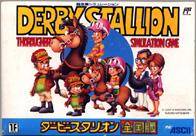
Best Keiba Derby Stallion (S17E05): Famicom, ASCII/ASCII, 1991.
Though I didn't think a racehorse-raising sim would lead to much entertainment, I was happily proven wrong by what turned out to be an instant GCCX classic. The game has something of a stringent tone, typical of ASCII's rather overbearing nature as a developer of hardcore strategy computer games, and Arino is not the sort of person who quickly picks up on nuances in complex games. Between inadvertently horrific moments like absentmindedly breeding one horse with its offspring to produce some sort of Lannistallion abomination, or times of desperate optimism like latching onto the untested and possibly dangerously unqualified E-rank (the only E-rank) jockey Ogawa, Arino mined a lot of material out of what appeared to be a very dry simulation game about horses.
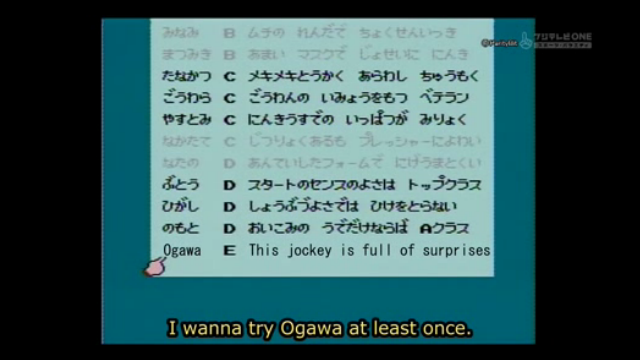
The Derby Stallion games are, of course, one of the most popular and prolific simulation franchises in Japan, and considered to be so intrinsically Japanese that not a single one of them has ever been localized into English, despite there being dozens of them. ASCII began the series with this game, Best Keiba, but the franchise would continue to expand and take on a new developer in Enterbrain, and it still persists with new entries to this day. The Japanese sure do love their horse-racing (though I suspect that surreptitious gambling has a lot to do with it too).
Tatsunoko Fighter
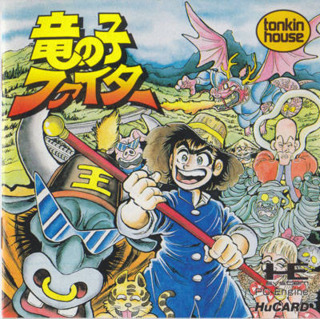
Tatsunoko Fighter (S18E01): PC Engine, ACC/Tonkin House, 1989.
Almost a predecessor to Kattobi! Takuhai-kun, given its identical developer/publisher combination and equal helpings of weirdness, this is another rare TG16 challenge that decides to mess around with Arino a bit by presenting a Monty Hall decision of three doors at the end of each stage, one of which will send the player back to the start of the level. Presumably added entirely to spite players, it's one of a great number of bizarre and sadistic challenges packed into this forgotten platformer. At least it does the kind thing and lets you continue from the last stage you reached. I actually admire its philosophy of "make the game hard, but the penalty for dying gentle", given how many games employ it nowadays.
Tatsunoko Fighter is an example of what I tend to think of as artist tie-ins; a phenomenon that seemed to spread shortly after the success of Dragon Quest and the much-publicized involvement of Dragon Ball artist Akira Toriyama. More games would follow this route, RPGs and otherwise, and procure the skills of a popular manga artist and attempt build a game around their output. Sometimes this meant licensing the existing franchises the artists were connected to, like the many adaptations of Osamu Tezuka's work (one of which, Hi no Tori: Gaou no Bouken (S03E06), was also an early challenge for Arino and a previously missing wiki page). Others just riffed on the sort of subjects the artist was known for drawing, like this game. The manga artist who lent his style to this game, Akira Miyashita, actually appears at the start of each level to encourage the protagonist.
Satsui no Kaisou: Power Soft Satsujin Jiken
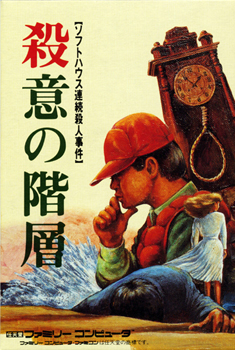
Satsui no Kaisou: Power Soft Satsujin Jiken (S18E04): Famicom, Hyperware/HAL Lab, 1988
One of the most recent SA-GCCX translations as of this blog is Satsui no Kaisou: Power Soft Satsujin Jiken, which roughly translates to "Hierarchy Of Murderous Intent: The Software House Serial Murders". As well as a word salad title, this murder mystery adventure game takes a meta approach and has the victim (and the ones that follow) be a video game developer. The game's notable for its multiple murders, which piles a lot of investigation work on the player, as well as its strict time limit of three in-game days. There's no running timer or anything; what happens is that each time the player moves, examines an object or talks to an NPC, the game's clock moves ahead a few minutes. A certain amount of judicious forethought (and save-scumming trial and error, if we're being honest) is required to reach the conclusion in time and deduce the culprit.

This episode presents one of quite a number of murder mystery adventure game challenges that summons the Kacho's alternate persona "Detective Arino". The staff provide him with a list of subjects, usually drawn on cards that can be stuck on the whiteboard Arino often uses for notes, which ends up becoming a police station flowchart web of suspects and victims that Arino regularly attends to for answers. It's enjoyable to watch him take apart the crime like a police procedural, and the staff have a lot of fun with it too, often dressing the current AD in a police uniform to be Detective Arino's assistant.
Ganso Saiyuuki: Super Monkey Daibouken
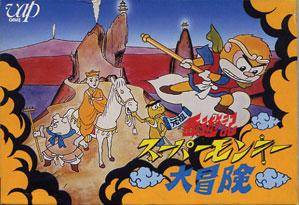
Ganso Saiyuuki: Super Monkey Daibouken (S3): Famicom, ???/Vap Inc., 1986.
I'll end with this special mention. Ganso Saiyuuki: Super Monkey Daibouken is a game loosely based on the ancient Chinese novel Journey to the West, which has popped up or been the basis of so many games, movies and TV shows by now that I'm sure everyone's familiar enough with it. A monkey, a pig and a kappa follow a Buddhist monk across Asia, fighting monsters and demons along the way. That's pretty much the jist. Monkey Magic, the Japanese TV show? Dragon Ball? Saiyuki: Journey West? SonSon? Enslaved: Odyssey to the West? Bueller?
Super Monkey Daibouken, though, is quite possibly the most reviled Famicom/NES game in the world. More so than the uninspired and half-assed output of Angry Video Game Nerd's hated LJN. It's utterly without direction, it's far too obtuse, prone to many bugs and glitches and it plays, looks and sounds terrible. And GameCenter CX decided to make it the centerpiece of a special serial feature within the show.

Ring-Ring Tactics, as this feature was called, involved Arino calling up members of the public who had supplied their information on a postcard mailed to the show, with the express purpose of eliciting their assistance to beat this awful game. Most of the time, the people he called had very little to offer in terms of practical advice, though enough remembered what to do (or simply played up to that point so they could be on TV) to direct Arino sufficiently enough that he was eventually able to beat the game. A sequel to Ring-Ring Tactics, in which the public helped Arino puzzle out the insanely tricky stages of Championship Lode Runner (a game developed strictly for those who thought the original Lode Runner was too easy), was somewhat less successful.
The Bit at the End
Well, that's probably enough said about GameCenter CX. Absolutely check it out, if you're curious. Ideally, by buying the Retro Game Master DVD box set that was localized for the US, but failing that (it may be out of stock by now), check out the episode torrents on SA-GCCX's official site, or the dubiously legal streaming videos on GamingCX. Though it may seem counter-intuitive, try to avoid the really popular games like Zelda or Mario (though Arino's ongoing rivalry with Bowser can get pretty fun) and start off with something you recall being way too unfair, like Battletoads or Ninja Gaiden. After that, just look around for whatever piques your interest. You'll be hooked in no time, provided you have the attention span for all those hour-long episodes.
My thanks for reading, and stay tuned for future Wiki Project rundowns in the future. I'm working on one right now, ensuring that we have pages for all the games scheduled for the upcoming AGDQ event next week. After that, I'm thinking of putting a cap on this TurboGrafx-16 infatuation by hashing out whatever's missing in that library, leaving the much more expansive PC Engine ludography for another time. At any rate, I hope to get a lot done for the Giant Bomb Wiki in 2015, and I'd like to see other articles like this from the many dedicated editors out there. Us GB Wiki folk are an underrepresented and underappreciated bunch these days. It's about time we change that.
I'll just leave you all by saying Happy New Year! Here's hoping 2015 will be better than 2014. Yeesh.
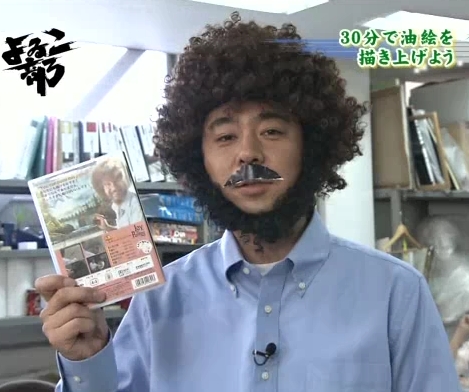
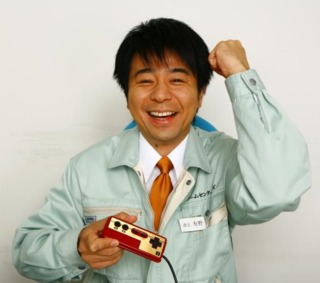
Log in to comment